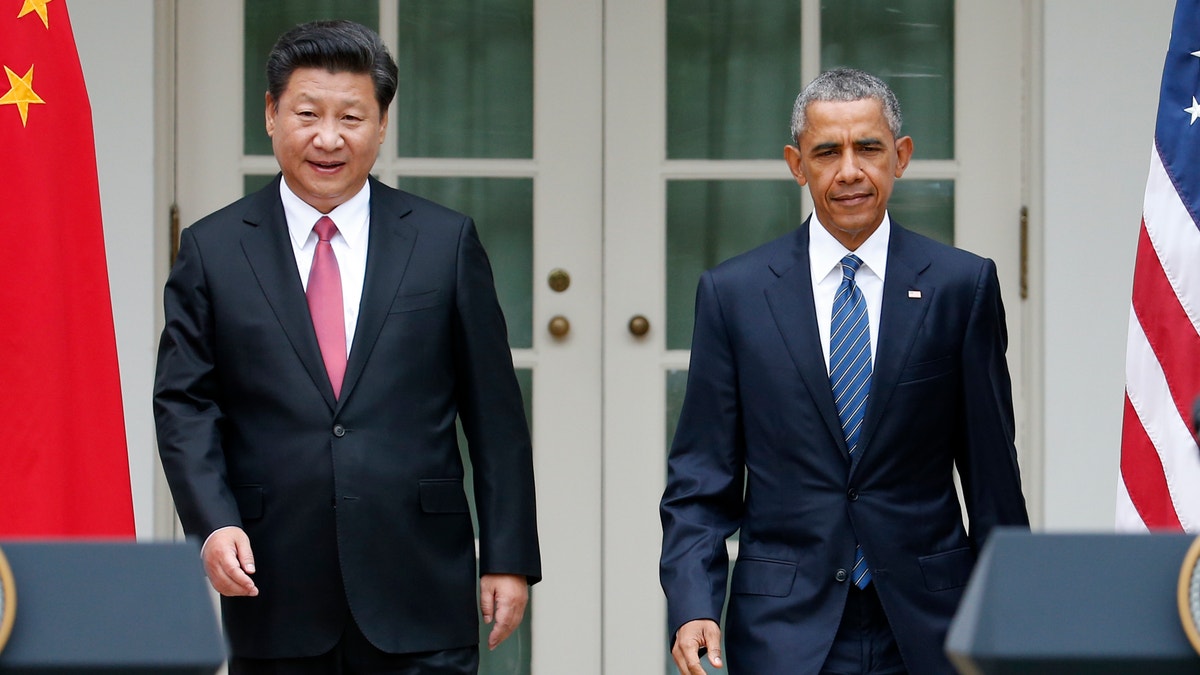
President Barack Obama and Chinese President Xi Jinping arrive for their joint new conference, Friday, Sept. 25,2015, in the Rose Garden of the White House in Washington. (AP Photo/Evan Vucci)
China and Taiwan are locked in a spiraling controversy over conflicting concepts of “citizenship,” with enormous implications both for them and the United States. The timing of the dispute is especially significant, as Taiwan prepares for next month’s inauguration of Tsai Ing-wen of the opposition Democratic Progressive Party (and Taiwan’s first female president). The DPP has long advocated explicitly declaring Taiwan independent from the mainland, rather than continuing its current ambiguous status,
Although extraditing alleged international phone scammers may not initially seem the stuff of high-stakes diplomatic statecraft, the stakes are high and figure in the much broader ongoing dispute across the Strait of Taiwan. Beijing struck first in Kenya, where Chinese and Taiwanese swindlers allegedly extorted money from mainland Chinese by masquerading as police calling about “illegal” conduct. Almost certainly because of Chinese threats to withhold substantial amounts of economic assistance, Kenya “deported” 45 Taiwanese citizens to China, even though they had been acquitted of phone fraud. Taiwan immediately complained that its citizens’ rights were violated by not being sent to their home country. Just days later, Malaysia returned 20 Taiwanese (apparently part of the same scam) to Taiwan, which promptly released them because of insufficient evidence, thereby eliciting Chinese complaints.
The ostensible dispute is whether China or Taiwan should have primary jurisdiction to investigate the phone scammers. Just beneath the surface, however, is the highly sensitive issue of citizenship, and how foreign governments treat Taiwan’s citizens and Taiwan itself. Taipei emphatically rejects Beijing’s claim that it is merely a province of China, and that its citizens are therefore really citizens of China itself. Now a free-spirited democracy, Taiwan is still formally called “the Republic of China” (as Chiang Kai-shek’s Kuomintang government was known when it fled to Taiwan in 1949, defeated in a decades-long civil war by Mao Tse-tung’s Communists).
Beijing has seized the deportation issue to fire a shot across Tsai’s bow, to warn the president-elect that China’s patience is limited. Xi Xinping’s regime did not want the DPP to defeat the ruling Kuomintang, with which it shares the “one China” view that Taiwan and China should ultimately be reunited (although with significant differences on how, when, under what circumstances). Mainland Chinese intervention in Taiwan’s politics has backfired more often than not, but the Communists have nonetheless persisted in trying to shape Taiwanese thinking to their advantage. Intimidating the incoming Tsai, known already as far more cautious than many other DPP leaders, is thus par for the course. The real issue is whether there is more coming, perhaps in the form of the Chinese equivalent of the 3:00 A.M. wake-up call to Taiwan’s new government after Inauguration Day.
America also has much at stake. China’s belligerent behavior in the South China Sea has escalated from building man-made islands to bolster Beijing’s territorial claims to constructing air and naval facilities on these islands. China already has a provincial capital for the region, and is proceeding rapidly to change the South China Sea from international waters into a Chinese lake before President Obama leaves office. Xi, like Russia’s Vladimir Putin in Eastern Europe, is testing how far it can push Obama before it meets real resistance. And for Xi, squeezing Taiwan is important in advancing China’s aim to achieve in the East China Sea what it is already doing to the south.
Beijing does not want actual hostilities, but believes it can achieve its central objectives by threats and pressure alone. In response, America should immediately engage in more extensive and assertive “freedom of navigation” operations in the South China Sea. Moreover, Washington should launch far more active diplomatic efforts to induce Southeast Asia’s other territorial claimants to resolve their competing claims and thereby present a united front to Beijing. With Taiwan, the United States should consider significant steps to upgrade its diplomatic relations. Washington should make clear that it considers Taiwan to be an independent, democratic society that has the full right to reject a forced merger with China, no matter what the aging rhetoric about “one China.”
In January 2017, America’s new president will face Beijing’s ongoing efforts to run its own extortion campaign against Taiwan. If the Obama administration fails to support Taiwan in responding appropriately to China’s assertive, nearly belligerent actions on deportations and many other issues, the new president will have even graver problems to solve. This is not a case where America should simply tote up its investments in Taiwan and on the mainland and go with the bigger number. This is a matter of resisting Chinese efforts at establishing hegemony in East and Southeast Asia not only at the expense of its near neighbors, but of the United States as well.
